The following notice went out today to all UK members:
Musicians are better off in a Britain that is part of the European Union (EU). That’s why we’re calling on all Musician Union members to vote to remain in the EU.
Over the last few weeks, we’ve had debates, flotillas and angry jibes traded over what makes Britain stronger and safer. For us, as the Musicians’ Union, it’s about what protects you as musicians and the life you work hard to make.
Thanks to the EU:
– European Copyright Directives protect your intellectual property rights, and your income
– Open borders make touring easier and cheaper
– Health and safety legislation keeps you safe wherever you work
– The Working Time Directive means part-time instrumental teachers can get holiday pay and sick pay.
The European Union also allows us to work on transnational issues that affect you.
Together, we’re fighting for legislation to make it easier for you to travel with instruments on planes. We’re working with other musicians’ unions across Europe to get legislation implemented at the European level that would force airlines to act.
We do not believe the EU is perfect.
We still lobby hard to make copyrights stronger, touring easier, and health and safety work better for you. But without the EU we have to question whether these rights would be protected at all and, if so, how strong those rights and protections would be.
That’s why we’re calling on all musicians to vote for Britain to remain in the European Union.
This is Carmen, currently at Opera Australia.
The role is sung by the French mezzo Clementine Margaine, reckoned to be one of the most seductive interpreters of the moment.
So why kit her out in a full-length overcoat?
Correction: It is Natalie Aroyan as Micaëla. The point still stands.
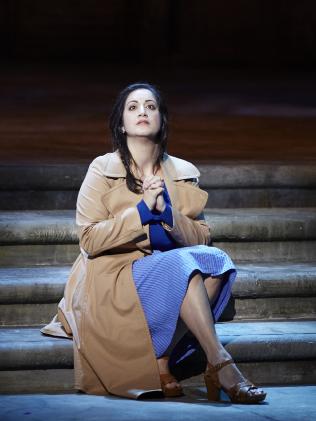
The director is John Bell, the designer Michael Scott-Mitchell.
The ticket-sales page bears no visual relation to the production.
Drew McManus has produced his indispensable annual account of orchestral salaries, based on IRS returns.
The 2013/14 list has more coherence than some past charts in which orchs tried to bury the cash by means of creative accounting and privacy claims. Some hidden benefits may still be excluded.
The top pay chart looks like this:
1 Deborah Borda, Los Angeles Philharmonic $1,586,820*

(*includes presidency of Hollywood Bowl)
2 Mark Volpe, Boston Symphony $852,607
3 Allison Vulgamore, Philadelphia O. $733,242
4 Gary Hanson, Cleveland O. $646,813
5 Deborah Rutter, Chicago Symphony $633,619
6 Matthew Van Besien, NY Phil $626,489
7 Brent Assink San Francisco Sym $557,312
No-one else breaks half a million.
Good to see three women in the top five.
Full report here.
This we like:
James Nicolson wins Scottish Orchestra’s national competition for composers aged 12-18 years.
Fellow competitor Tom Aitken’s work to be performed at the opening of Scottish Parliament in July.
Would never happen at Westminster.

Dallas Opera is setting the pace for young women conductors. Out of 156 applicants for the next course, six have been selected. They are:
ELIZABETH ASKREN (USA)
Elizabeth Askren has worked as Assistant Music Director in leading European venues (Théâtre des Champs Elysées, The Concertgebouw, etc.) and has guest conducted orchestras such as the London Symphony Orchestra, the Orchestre de Chambre de Paris, and the Royal Philharmonic Orchestra. Débuts for the 2015-16 season include concerts with the Romanian National Opera in Cluj and the Opera Orchestra of Toulon. Ms. Askren is a laureate of France’s ADAMI, and has received fellowships from the Salzburg Mozarteum, the Royaumont Foundation, and the Aldeburgh Festival. A finalist candidate for the Mahler Competition, she was invited by Lorin Maazel as “Apprentice Conductor” for the inaugural season of the Castleton Festival in Virginia. She is the subject of several radio and press interviews, and is currently a Young Leader of the French American Foundation. Ms. Askren holds diplomas in piano and conducting from the Juilliard School, Oberlin Conservatory, and the Conducting Institute of Bard in the United States, and the Schola Cantorum and the Ecole Normale de Musique in France.
MIHAELA CESA-GOJE (ROMANIA)
Mihaela Cesa-Goje gained widespread attention in 2009 as the winner of the Taki Concordia Conducting Fellowship founded by Marin Alsop and in 2010, a Conducting Grant from the League of American Orchestras. In 2011, she was awarded the Dudamel Fellowship from the Los Angeles Philharmonic, and later that same year, was selected from a field of 160 candidates for a masterclass with Bernard Haitink and the Lucerne Festival Orchestra. Earlier in her career, Ms. Cesa-Goje received the “Sandor Vegh Prize” from the Romanian Mozart Society for an outstanding performance of Mozart’s “Der Schauspiele Direktor” at the Cluj National Opera, Romania. In 2005, she completed her Conducting Diploma at the Royal Academy of Music in London and was awarded the Irene Burcher Prize. In 2013, she earned a graduate degree in conducting from Gh Dima Music Academy in Cluj, Romania, where she studied with Florentin Mihaescu. She also studied with Harold Farberman, Gustav Meier, Patrick Russill and Roland Börger. Ms. Cesa-Goje is regularly invited to Cluj National Opera. In her first season (2014) she conducted eight different titles.
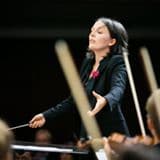
ALEXANDRA CRAVERO (FRANCE)
As a musician of many talents with a charismatic personality and artistic sensibility, Alexandra Cravero has quickly earned the reputation of being one of this generation’s conductors to watch. With a National Diploma and Masters in viola and conducting from the National French Conservatory, Alexandra was also finalist at the Besancon, Pedrotti, and Cadaques competitions. She has assisted Pierre Boulez, Kurt Masur, Tito Ceccherini, Patrick Davin and directed the BBC, the Monte-Carlo Philharmonic, the Sofia Radio, the Theatre de La Monnaie and the Opera National du Rhin Orchestras. On the operatic stage, she has directed, among others, Annick Massis, Michael Spyres, Magdalena Kožená, and Etienne Dupuis. Her vast operatic repertoire spans many centuries: Carmen, The Pearl Fishers, Norma, Faust, Porgy and Bess, The Cunning LittleVixen, Reigen, and Doctor Atomic, to name a few. Upcoming engagements will see Alexandra Cravero direct The Tales of Hoffmann, Tosca, La traviata, and the Orchestre National de Lille at the Paris Philharmonic Hall.
TIANYI LU (NEW ZEALAND)
Now based in the United Kingdom, Tianyi Liu is the Junior Fellow in Conducting at the Royal Welsh College of Music and Drama and Music Director Designate of the Bristol Metropolitan Orchestra. She has been assistant conductor toThomas Søndergård with the BBC National Orchestra of Wales, Sir Mark Elder with the Hallé, Alice Farnham with the Welsh National Youth Opera and Carlo Rizzi at the RWMCD. She is regularly engaged by orchestras throughout Wales and New Zealand and was Music Director of The Magic Flute with Opera Otago. Ms. Liu has studied with David Jones, John Hopkins and Uwe Grodd and has attended masterclasses with Bernard Haitink, Neemi Järvi, Sian Edwards, Alexander Polynichko, Marin Alsop and Kenneth Kiesler. She was voted as a finalist at the twelfth ‘Interaktion’ conducting workshop by players of the Berlin Philharmonic and professional players in Germany.
CHAOWEN TING (Taiwan)
Winner of the 2009 International Conductors’ Workshop and Competition, Chaowen Ting currently serves as Conductor of the Georgia Tech Symphony Orchestra. A protégé of Bernard Haitink, Ting studied with the maestro at Lucerne Festival and was later invited by Haitink to observe his work with the Boston Symphony Orchestra and Chicago Symphony Orchestra. Outside of the U.S., she has conducted the Lucerne Festival Strings (Switzerland), Mihail Jora Bacău Philharmonic (Romania), Zagreb Philharmonic Orchestra (Croatia), St. Petersburg Chamber Philharmonic (Russia), and Orquesta Filarmónica de Honduras (Honduras). She won the 2013 Bruno Walter Memorial Scholarship and was a Conducting Fellow at the Cabrillo Festival of Contemporary Music. In addition to her symphonic repertoire, opera productions she directed received honors from National Opera Association’s Opera Production Competitions for two consecutive years.
ZOE ZENIODI (GREECE)
Zoe Zeniodi has conducted productions at the Florida Grand Opera, Greek National Opera, the Onassis Cultural Center and guest conducted all the major Greek orchestras as well as Tatarstan National Symphony Orchestra, the Brno Philharmonic, Palm Beach Symphony, New Florida Philhamornic, and JONDE, among others. She is currently the Music Director of Broward Symphony Orchestra, Momentum Athens Chamber Orchestra and the Associate Music Director of the Festival of the Aegean. Previous positions include: Chief Conductor of MOYSA, Assistant/Cover Conductor for Florida Grand Opera, Music Director of Alhambra Orchestra and Associate Conductor of Frost Symphony Orchestra. She has released five CD recordings of contemporary music. Ms. Zeniodi holds a DMA in Orchestral Conducting from the University of Miami and also studied at the Royal College of Music and the Mozarteum, Salzburg.

A must-read critique by Andrew Grossman in, inexplicably, a site called Pop Matters. The headline is: Why is Opera so Derided in America?
Sample:
The very existence of opera in 21st century America seems a defiant anachronism, a magnificent corpse that, inexplicably, still breathes. Whatever cultural capital opera retains in Europe or Russia is nowhere to be found in America. What fills opera houses is an overgrown swamp of verismo, a “cinematic” mode that sweetly colonized the operatic imagination long ago. There are bold new opera productions, of course, but the wild machinations of avant-garde directors only expose an old repertoire needing far more than sexy revisionism.
A desiccated bel canto score will thwart attempted (post-)modernizations as a moribund body rejects a transplanted heart with too fast a beat. An all-nude production of Meyerbeer’s Les Huguenots relocated to a ‘80s-era Caribbean cruise ship will still sound like Meyerbeer, even if appendages swing with abandon and the director splays the bodies of Huguenots slain in the St. Bartholomew’s Day Massacre throughout the ship’s late-night comedy club. Likewise, a sanguine director can relocate Bellini’s Norma to an outer-space brothel and invest the action with robot sex and multi-breasted aliens, but you’ll still have to listen to Bellini for three hours.
Read on here.

This is the new Alban Berg monument in front of the Vienna Opera.
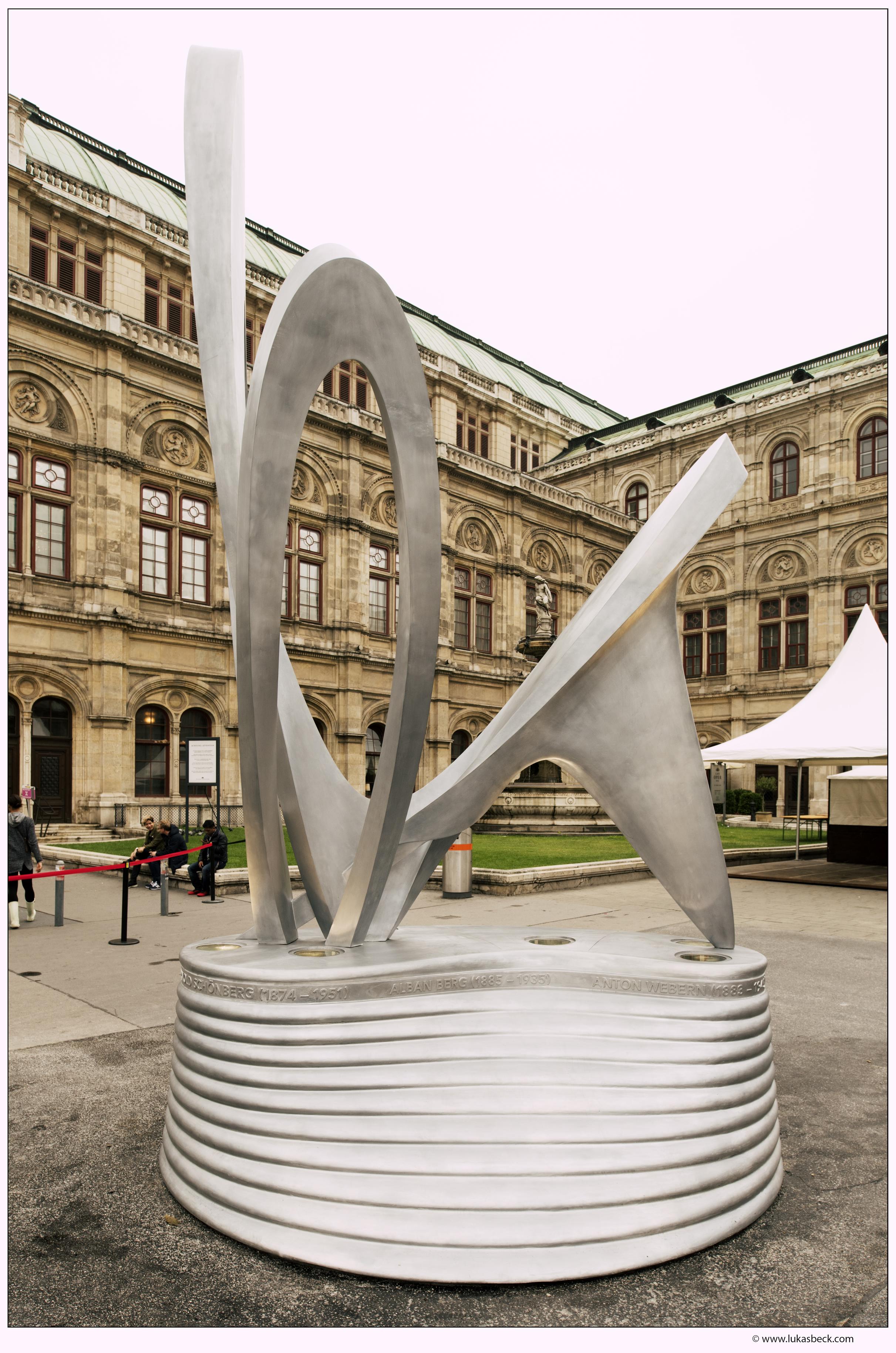
photo (c) lukas beck
Doesn’t get much uglier, but maybe that’s the message they want to convey.
First review of last night’s Manon Lescaut, set by director Robert Carsen in a shopping mall, depicts Anna as a dedicated Shopping Queen.
Don’t they know she never shops in malls?
She does her shopping at Chopard.

Review here.
The soprano Julia Kogan has filed Defence and Counterclaim at the High Court in London, asserting her rights to be credited as a co-author of the Florence Foster Jenkins film, starring Meryl Streep. Her claim is strongly contested by her former boyfriend, Nicholas Martin, who is credited as the sole scriptwriter. Mr Martin’s defence team maintains that any contrary claim may be considered defamatory.
Meryl Streep is tipped for an Oscar for her portrayal of the title role.
We asked Ms Kogan for her side of the story, based on her court submissions.

Slipped Disc: Where did you come across Florence Foster Jenkins?
I came across FFJ in my sophomore year of university as a classical Vocal Performance and English Literature major in the US.
What was your reaction?
I laughed till I cried. I was just starting to learn the great coloratura arias myself and was finding them fiendishly difficult. FFJ became a permanent source of comfort and relief for me as I struggled to improve. “Inspiration” is definitely the wrong word.
Had you written a film script before?
I was obsessed with writing (and reading, I hasten to add) since I was a child. My mother tells me she and my father came into the living room one day when I was three and found me reading a newspaper. At university, it became increasingly obvious that I had to choose either music or literature as my focus, since both demanded an all-out commitment of time, energy and resources. I decided that I could and would write later when I had more to say. I wrote three children’s books when my own sons were young, which are hopefully about to be published by Parragon, and I managed to combine my literary tendencies with my singing work. My second recording, “Troika: Russia’s westerly poetry in three orchestral song cycles “, is almost a cross-over album in an untypical sense of the word. It combines music and literature and examines them as reflectors of cultural identity. I then adapted and translated a work by Marina Tsvetaeva to create “The Lad”, an opera-ballet that was to premier at English National Ballet (before the then director Wayne Eagling left) and had started researching “The Lost Songs of Hollywood”, a fascinating story that I wrote up and presented as a documentary on BBC Radio 4 (with Nicholas Martin’s input at the early development phase and Chris Elcombe and Dave King’s wonderful work as producers). In other words, writing and the creation of literary content, in both documentary and fiction, was very much part of my life. Then, things took an unexpected, and possibly even cinematic, turn.
Within four days of meeting Nicholas Martin in September of 2011, I was nearly killed in a car crash while on my way to record another CD at Champs Hill with my pianist friend Marc Verter. Nicholas, who had recently lost his job writing for Midsomer Murders, began talking to me about his work, which I found both riveting and entirely up my street. The development of screenplays quickly became our relationship, or vice versa, as I tried to recover from my injuries.
I started out by giving Nicholas feedback on his previous projects, then by pitching in to help with new ideas he was developing, and finally by suggesting new projects to him and collaborating on every aspect of the writing and development of our creations for film and television. The lines between our private and professional lives were completely blurred. We wound up working on many projects together, four of which I consider to be “co-creations” because they didn’t and couldn’t have existed without me. I’ve continued to write and am now working on three new screenplays.
What was your response when Mr Martin told you he had sold the script?
Well, I was thrilled. I had asked to be considered his official co-author from the start, but Nicholas refused, citing the potential for conflict and his history as a screenwriter as reasons to be the only publicly credited writer. I accepted his reasoning largely because he was so openly acknowledging of my work in private – I have letters and chats where he gushes about how much he loves working with me. I also accepted it because I was in the most vulnerable state of my life at the time. Lost story short, I continued to work with him while he put his name alone on the scripts. Contracts were the last thing on my mind, as was the possibility that he would rewrite history in its entirety and take all credit and money. Why do women (mostly) get themselves into these sorts of situations? The explanation would be long, personal and ridden with psycho-babble.
Did you meet the production team?
I met Michael Kuhn when he came to an Ariadne auf Naxos performance in which I sang Zerbinetta in May of 2014 and Stephen Frears in October of 2014. Stephen opened the conversation by saying “And I suppose that this all came from you?”, before I launched into my background with FFJ’s story with Nicholas sitting next to me. I worked with the production team on various musical issues in the script, for which I was also never paid or credited. After my relationship with Nick ended, no one thought to invite me to a single day’s filming, the premier, or anything else. They had no further use for me.
A great deal of effort is now being expended on calling me a singer and singing teacher, lest anyone should think I might have other marketable skills. Apologies for the sarcasm. But actually and factually, being a writer is neither a diploma nor a paycheck. It is a skill, one that enables a person to voice thoughts and emotions in a way that touches others. The proof is in the pudding (or rather the virtual ink) with writers, and I don’t think anyone can take my love of writing or my ability to do it away from me.
A word about why we are talking about this now: I’ve kept quiet about this conflict for years because I didn’t want to cause trouble for anyone. I had hoped we could come to some sort of agreement privately. When Nicholas Martin issued legal proceedings against me in April, it brought his Particulars of Claim into the public domain and the whole case into the public eye. I now feel obliged to try and correct some of the inaccuracies that were reported in the press. People love a good, simple story about a dagger-wielding opera singer taking her revenge on her ex-partner (The Times, in true tabloid fashion, published a photo of one of my “Queen of the Night” performances to ensure I looked appropriately furious). That simply isn’t the reality of it.
Was this a factor in your breakup?
We argued increasingly about the film once the project began taking off. It started with his rewriting of the narrative surrounding the idea – something Nicholas had always readily credited me with. In fact, I had spoken to a friend about the possibility of working on a French adaptation of a play about FFJ, which is why FFJ’s story was on my mind at that time. I knew we had to hurry if we were to beat everyone else to the punch. It is the most colourful story in all of classical singing, in my opinion. But in Nicholas’ new narrative, the idea suddenly became his and something he stumbled across accidentally. I objected vehemently to this.
The week Meryl Streep joined the project, Nicholas became visibly miserable at my presence in our home. When I questioned him, he told me that he felt like no part of his life belonged to him anymore. I moved out that day, though the relationship continued on and off until October 2014, while our friendship and much-reduced collaboration continued until he broke off all contact with me in March of 2015. I had asked about my share of the film money – a share which he himself had suggested. By then, he was denying that I should be paid or credited for anything at all.
Have you seen the finished film?
I saw the film several days ago. It was surreal for me to be sitting there in the audience watching it. I amused my fiancé by speaking the lines along with the characters.
Anyone who has ever been interviewed by Israeli media will flinch at the directness of the question, Itzhak takes it with practised equanimity.
What kind of a teacher are you? “I think an okay one,” he laughed a sonorous, free laugh, and not for the last time in our conversation. “I’m not old fashioned; I don’t believe in forcing students, and I remember how much I hated practicing myself. My first teacher would blame my parents if I didn’t play well, ‘You don’t make him practice!’ Even today, I hate practicing, but at least I understand that it’s important.”
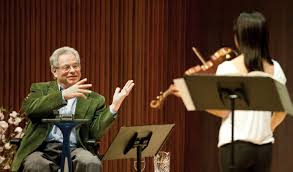
How do you identify talent? “Sometimes it’s enough to look them in the eye. Once a child understands what he’s playing, I can identify that in his playing. The really talented have special instincts and an ear that reacts in a way that others don’t.”
Can anybody learn to play? If I practice 12 hours a day, will my zero talent turn into something? “Maybe. They say that a good teacher is measured by what he manages to get out of average talent, not out of geniuses. Sometimes, you teach someone for two years, and suddenly, during a lesson, something happens, this thing that you’ve been waiting for breaks out. It can bring me to tears. But zero talent is maybe a bit of a problem,” he laughs aloud again.
More here on Ynet.
Michael Garady, life companion of Peter Feuchtwanger who died at the weekend, has asked us to publish his personal tribute, adjoined by Leonard Bergaman who was one of Peter’s last students.
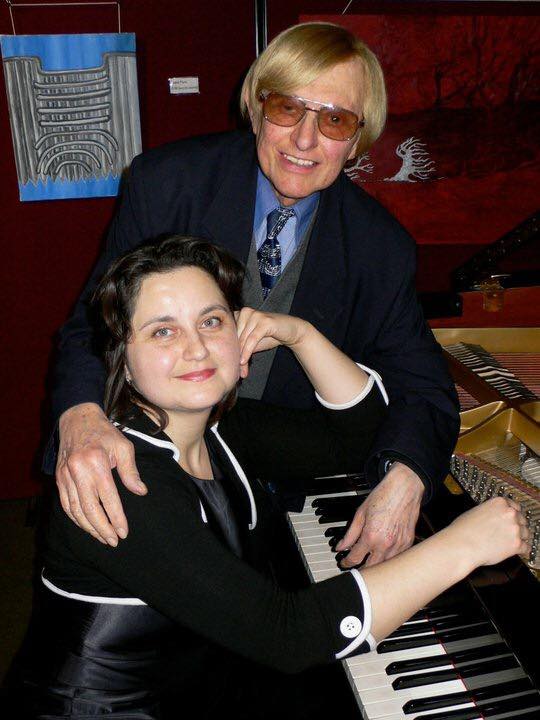
Ein persönlicher Nachruf auf Peter Feuchtwanger.
Es gibt Menschen, die sind so lange präsent und durchdringen mit ihrem Wirken derartig viel, dass es schwer vorstellbar erscheint, dass sie eines Tages nicht mehr unter uns weilen.
Bei dem im letzten Jahr verstorbenen Altbundeskanzler Helmut Schmidt war das der Fall, doch abseits der Welt der Politik gibt es Menschen , die auf ganz sanfte uneigennützige Weise die Welt zu einem besseren Ort werden lassen.
Nun ist am 18.6. um Mitternacht der große Musiker und Mensch Peter Feuchtwanger gestorben.
Generationen von Musikern und Scharen von Schülern verdanken ihm unendlich viel. Führt man sich die lange Liste derer vor Augen, die von ihm beeinflusst und geprägt worden sind, tauchen da Namen wie Martha Argerich, Dinorah Varsi, Youra Gouller , David Helfgott und Shura Cherkassy, um nur einige zu nennen. Doch als wäre das nicht schon staunenswert genug, sollte nicht unerwähnt bleiben, dass sich Peter Feuchtwangers segensreiches Wirken auch auf die weniger Bekannten und Begünstigten, ja mitunter weniger Begabten richtete.
Und er behandelte sie alle gleich, egal ob feste Größen in der Musikwelt oder Anfänger, die keinen “Namen” haben.
Es war ihm ein Anliegen, das Beste in allen seiner Schüler ans Licht zu bringen.
Mit meistens wenigen Worten und sparsamen Hinweise schaffte er viel mehr als die meisten um viele Worte bemühten Klavierpädagogen.
Schon seine bloße Anwesenheit und Aura hatten eine angstlösende und befreiende Wirkung.
Schüler, die das erste Mal zu ihm kamen und seine Präsenz erlebten, waren verblüfft, dass eine derartige Koryphäe wie Professor Peter Feuchtwanger nicht die geringste Spur eines Egos zeigte oder gar die strenge Präsenz eines Lehrers, der seinen Schülern um jeden Preis einen Stempel aufdrücken möchte. Pädagogische Tyrannei stand ihm fern, er hatte sie schlicht nicht nötig.
Vielelicht werden diese in der rauen Musikwelt raren Qualitäten, -gerade in der höchsten Liga-verständlicher , führt man sich Peter Feuchtwangers Werdegang näher vor Augen:
Als Sohn eines Münchner Bankdirektors in ebenjener Stadt geboren (irgendwann in den 1930er Jahren), lernte er durch das Schicksal der Emigration schon früh das Leben von einer seiner härtesten und heikelsten Seiten kennen.
Doch trotzdem hasste er nie.
Er hasste nicht die Menschen, die ihm die Heimat genommen hatten, hasste nicht die Menschen, die ihn entwurzelt und seine Familie demütigen wollten und ihr nach dem Leben trachteten.
Er erkannte, dass diese niedere menschliche Regung nie eine Lösung für ein Problem irgendeiner Art sein kann, sondern alles nur noch schlimmer macht .
So blieb er sanft und beschloss, den Menschen zu helfen, bessere Musiker und Menschen zu werden.
Und das ganz frei von allem Messianischen oder Egozentrischen. Als Kind und Jugendlicher war Peter Feuchtwanger eine phämonenale musikalische Begabung, die Ihresgleichen suchte. Entwurzelt in Palästina, begann er autodidaktisch mit dem Klavierspiel und lernte, indem er ein Gros der Klavierliteratur von einem Schallplattenspieler einen Halbton zu hoch nachspielte. Auf diese Weise entwickelte er eine einzigartige natürliche Technik des Klavierspiels, aus der er später seine weltbekannte didaktische Methode entwickeln konnte, die vielen Pianisten mit verkrampfter und ungesunder Spielweise von Sehnenscheidenentzündungen, Tennisarmen oder anderen Malaisen zu befreien vermochten und ihnen eine weitere Ausübung ihres Berufs wieder ermöglichten. Einige sehr bekannte Pianisten konsultierten ihn im Vertrauen, humorvoll pflegte er dazu zu sagen:
“Das sind meine Geheimschüler.”
Sehr schwer zu begreifen ist, dass Peter Feuchtwanger bis zu seinem dreizehnten Lebensjahr keine Noten lesen konnte. “Ertappt” wurde er von einem Lehrer zurück in Deutschland, als er die sogenannte “Mondscheinsonate” wie für ihn gewohnt
in d-moll wiedergab , statt an dem für das Stück unerlässlichen , charakteristisch- düsteren und glutvollen cis- moll.
Daraufhin begann die systematische Asubildung nach einem wirklich unorthodoxen Anfang.
Seine geniale Begabung wurde in der Schweiz erkannt und gefördert, prägend waren die Zusammenarbeit mit Klavierlegende Edwin Fischer (ebenso Lehrer von Alfred Brendel) , Walter Gieseking, dem phänomenalen Interpret französisch- impressionister Musik, sowie nach eigenem Bekunden wohl der wichtigste Einfluss: die große und unvergessliche Pianistin Clara Haskil.
Noch im vergangenen Jahr, während einer Taxifahrt im herbstlichen London schwärmte er von der Pianistin:
“Clara Haskil war das größte Erlebnis in meinem Leben und daran hat sich fünfundfünzig Jahrenach ihrem Tod nichts geändert.
Die beiden verband eine sehr natürliche Handhabung des pianistischen Spiel-Apparats und eine zunächst autodidaktische Herangehensweise.
Charlie Chaplin meinte einmal, in seinem Leben wäre er nur drei Genies begegnet: Churchill, Einstein und Clara Haskil.
Immer wieder sprach Peter Feuchtwanger mit Begeisterung von den Interpretationen der mittleren a- moll – Sonate D 845 von Franz Schubert oder der mittleren Beethoven- Sonate op. 31/3 in Es -Dur.
Doch nicht vergessen darf man, wie wichtig die fast vergessene Tradition des Belcanto und Kunst des “Singens auf dem Klavier” für ihn waren. Wer einmal mit ihm an Chopin arbeiten konnte, wird es als Offenbarung im Gedächtnis behalten bis zum letzten Atemzug.
Wohl beeinflusst durch sein Aufwachsen im Nahen Osten, zeigte Feuchtwanger schon früh ein ebenfalls großes Interesse und Begeisterung für die arabische und auch die indische Musik.
Da er über eine ausgeprägte schöpferische Ader besaß, drängte es ihn schon bald zur Komposition.
Den Kontrapunkt Palestrinas studierte er ebenso gründlich wie die komplizierte Rhythmik und den Stil der indischen Raga- Musik.
Faszinierende Produkte dieser Auseinandersetzung sind die unvergleichlichen Klavierwerkde “Studies in Eastern Idiom” und die sehr schweren “Variations in an Eastern Idiom” von 1957. Mit diesem Wurd gewann er im gleichen jahr den Viotti- Kompositionswettbewerb, woraufhin Yehudi Menuhin auf ihn aufmerksam wurde und ein Werk für Ravi Shankar und ihn im Rahmen des “Bath Festivals” 1966 in Auftrag gab.
Die besagte Kompostion wurde ein enormer Erfolg den man immer noch auf der Platte/CD “East meets West” nachhören kann. Leider fehlt dort aus unerfindlichen Gründen jeglicher Hinweis auf den Verfasser der “Raga Tilang”.
Weitere Kompositionen folgten bis in die 1990er Jahre und bisher befindet sich nur ein kleiner Bruchteil verlegt im Handel. Martha Argerich äußerte sich schon früh enthusiastisch über Peter Feuchtwangers Oeuvre:
“Peter Feuchtwangers Klaviermusik hat mich sehr beeindruckt aufgrund ihrer Tiefe, großen Frische und Originalität. Dies sind Qualität, die heutzutage sehr selten sind. Pianistisch gesehen sind seine Kompositionen höchst raffiniert und äußerst lohnend. Jeder Konzertpianist sollte sie in sein Repertoire aufnehmen. Dies wird verständlich, wenn man in Betracht zieht, daß Peter Feuchtwanger selbst ein wunderbarer und in jeder Beziehung außergewöhnlicher Pianist ist. ”
Der junge Peter Feuchtwanger absolvierte eine glanzvolle Karriere als Pianist. Doch uns schwer wollte er sich in den erbarmungslosen Konzertbetrieb einfügen, der schon damals an die Substanz eines jeden sensiblen Menschen ging.
Da er über ein außergewöhnliches, ja beängstigend gutes Gedächtnis verfügte, sei er von Agenten oft ausgenutzt worden. Das berichtete er mir vor einiger Zeit um dann verschmitzt lächelnd hinzuzufügen:
“Edwin Fischer kam in die Festival- Hall und sollte op. 109 von Beethoven spielen. Dann meinte der Agent, sie spielen ja das gleiche, morgen werden sie op. 110 spielen oder gar nicht. Dann übte ich vierzehn Stunden am Vortag und als das Konzert begann, brach mir der Schweiß aus. zwar kam ich gut bis zur komplexen Fuge, dort aber musste ich schweißüberströmt tricksen. Der Kritiker schrieb danach, die Fuge sei der Höhepunkt des Konzerts gewesen”.
Die rauhe Luft im Konzertbetrieb hat nicht nur ihn schon früh abgestoßen, sondern auch Kollegen wie Friedrich Gulda, Arturo Benedetti Michelangeli oder Andrej Gavrilov. So entschloss er sich, seine Laufbahn als Konzertpianist trotz großen Erfolges einzustellen und sich ganz dem Unterrichten und Komponieren zu verschreieben.
Und er schien glücklich damit, selbst wenn er oft seine Trauer über den Zustand der Welt und seinen Unmut mit dem oft absurd fordernden und grausamen Musikbetrieb zum Ausdruck brachte. Niemals konnte er sich in das Korsett einer Musikschule begeben. Zwar war er Gastprofessor unter anderem ein Salzburg, jedoch zog er es vor, weltweit seine eigenen, unnachahmlichen Meisterkurse zu geben.
Es herrschte immer eine äußerst familiäre ja liebevolle Atmosphäre und Peter Feuchtwanger schien stets im Nu die Eigenheiten und auch Probleme eines jeden Schülers mitfühllend- intuitiv erfasst zu haben, was bisweilen an Magie grenzte.
Unzähligen Musikern mit schweren Lebensschicksalen wusste er zu helfen, an prominenstester Stelle dem Pianisten David Helfgott.
Einzigartig unter Seinesgleichen war Peter Feuchtwangers bescheidenes und unprätentiöses Auftreten in der Öffentlichkeit. Gut erinnere ich mich an unser Erstaunen und Schmunzeln, als Peter Feuchtwanger in Hüde am Dümmersee bei Osnabrück im Jahr 2009 mit zwei alten Plastiktüten von SPAR , prall gefüllt mit zerknitterten Notenausgaben stand. Für seine Schüler scheute er nicht die größte Anstrengung, oft arbeitete er an Kurstagen vierzehn Stunden bis zur völligen Erschöpfung mit seinen Schülern:
Ohne diese jemals mit einem Wort unter Druck zu setzen. Beschimpfungen oder missbilligende Äußerung gab es bei ihm : NIE.
Es machte ihn glücklich, sein Wissen an eine riesige Schülerschar weiter zu geben und dann wie eien Saat aufgehen zu sehen. Einmal ließ er über seine Schüler die Bemerkung fallen : “Alles meine Kinder!”
Und wie ein Vater oder Großvater nahm er sich wirklich allen ihm Näher stehenden Schülerinnen und Schülern an. Er machte sich ehrlich Sorgen, wenn es einmal nicht so gut lief, freute sich umso mehr , wenn sich Erfolge und Glück einstellten.
Dabei war er wie schon angedeutet nie ein Mann großer Worte.
Hochgebildet und belesen, fähig dazu acht sprechen zu sprechen (darunter arabisch und hebräisch) sowie durch seine Familie zutiefst in der deutschen Hochkultur verwurzelt: Ein entfernter Onkel von ihm war der Schriftsteller Lion Feuchtwanger, er selbst noch mit Thomas Mann (Besuch 1952 in Kilchberg) und Hermann Hesse (Wanderung im Tessin) und Erich Kästner persönlich vertraut.
Wenn er anfing, Anekdoten aus seinem überaus reichen und bewegten Leben zum Besten zu geben, kam man oft aus dem Staunen nicht mehr heraus:
Arthur Rubinstein, den er im Paris der Sechziger Jahre oft besuchte kam genauso vor wie seine Begegnung mit dem Klavier- Zauberer Vladimir Horowitz , den er einmal in New York besuchte . Fasziniert und faszinierend demonstrierte er des Öfteren, wie Horowitz ihm auf dem Boden sitzend in das Geheimnis, wie farbige Akkorde zu spielen seien, eingeweiht hatte.
Peter Feuchtwangers Erfahrungsschatz war schier riesig und grenzte ans Unendliche.
Bis zuletzt war es seine Leidenschaft, sein Wissen an so viele Schüler wie möglich weiterzugeben, das allerdings niemals wie ein dominanter Guru und schon gar nicht wie ein “Musikdiktator”.
Bis vor wenigen Tagen konnte man sich noch direkt von dem großen Musikmeister in South Kensington, beraten zu lassen. Nun ist Peter Feuchtwanger in hohem Alter zu Hause gestorben, allerdings leider ohne sein Wunsch-Lebensalter von über hundert Jahren erreichen zu können .
In seinen Schülern, die ihn sehr vermissen, lebt er vielfach weiter.
Unser Migefühl gilt allen,die ihm Nahe standen, insbesondere dem australischen Maler Michael Garardy, der Peter Feuchtwanger gerade in den letzten Jahren als “life companion”eine unschätzbare Stütze war.
Danke lieber Peter Feuchtwanger, der Mut und die Menschlichkeit Ihres gelebten Lebens werden vielen Menschen Vorbild sein!
Leonard Bergman











